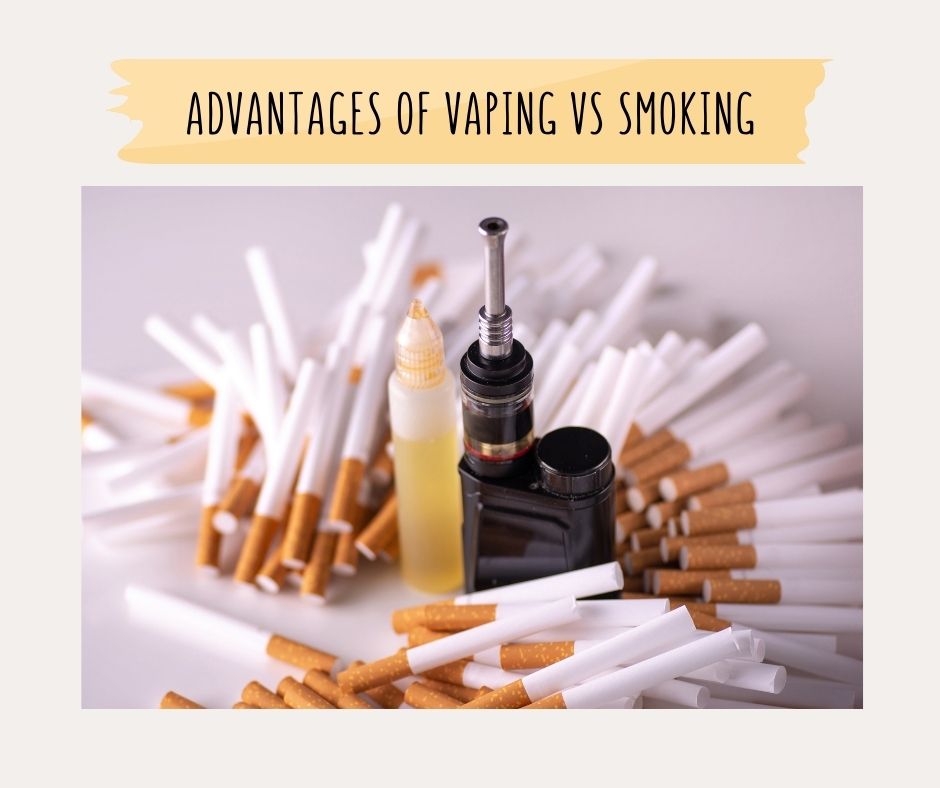
Both smoking and vaping have their own set of hazards and negative effects. Scientists do not yet completely understand the long-term health implications of electronic cigarettes (e-cigarettes), but the evidence suggests that they are not a safe alternative to smoking as a result of their design.
Vaping is the act of inhaling an aerosol that includes a variety of substances, including nicotine and flavoring, while using an e-cigarette or other device to deliver the aerosol. According to a poll conducted in 2018, vaping is becoming more popular among youngsters.
In this article, we compare and contrast the hazards of vaping versus smoking, as well as the long-term impacts and risks associated with both.
Which is less harmful?
Neither smoking nor vaping is advantageous to one's overall health and wellbeing. According to the research currently available, smoking seems to be more dangerous than vaping. However, this does not imply that vaping is completely risk-free.
Johns Hopkins Medicine believes that vaping is somewhat less dangerous than smoking and that this is supported by research. They point out that a person who smokes inhales around 7,000 chemicals, while vaping is anticipated to have a less number of chemical inhalations.
According to the AHATrusted Source, vaping liquids have far less toxins than cigarettes. But they also argue that vaping is not safe for the user because of the following factors:
- E-cigarettes contain a high concentration of nicotine, which has been shown to retard the development of the brain in fetuses, children, and adolescents.
- If adults or children consume or inhale the liquid that produces the vapor, or if it comes into contact with their skin, they might be seriously injured.
- While vaping, users are exposed to a variety of potentially hazardous substances, including diacetyl and cancer-causing chemicals as well as heavy metals and volatile organic compounds (VOCs).
As vaping grows more widespread, it has the potential to re-normalize smoking. According to the Centers for Disease Control and Prevention, since the removal of vitamin E acetate and other potentially dangerous components from vaping products, the number of symptoms experienced by individuals due to vaping has decreased.

In contrast to vaping, which is a relatively recent phenomenon, there has been years of study to completely support the argument that smoking is harmful to human health. According to the Centers for Disease Control and Prevention's Trusted Source, smoking causes:
- Lung cancer accounts for 90 percent of all cancer fatalities.
- Chronic obstructive pulmonary disease (COPD) is responsible for around 80% of all fatalities (COPD).
- It causes a higher chance of dying from any cause.
- In addition, there is a higher chance of acquiring health issues such as heart disease and stroke.
- It can cause harm to every organ in the body.
Long-term effects of smoking
Smoking has a variety of negative impacts on the body over the course of a lifetime. According to the Centers for Disease Control and Prevention's Trusted Source, smoking:
- lowers sperm count,
- raises the likelihood of miscarriage or the development of congenital defects,
- raises the likelihood of developing cataracts,
- may cause cancer in almost any area of the body, including the lungs, kidneys, and stomach;
- can induce asthma episodes;
- can cause cancer in nearly any part of the body, including the lungs;
- causes clots to form in the veins and arteries,
- raises the likelihood of having a stroke,
- negatively impacts a person's general health, resulting in concerns like lost work and higher healthcare bills.
Long-term effects of vaping
There is presently little information available on the long-term impacts of vaping. According to the University of Iowa, the aim behind vaping was to provide smokers with a safer alternative to obtain their nicotine fix than smoking cigarettes.
Some individuals feel that using a vape pen is an effective method of quitting smoking.

Using a vaporizer vs smoking marijuana
A person may inhale tetrahydrocannabinol with the use of a vaping equipment (THC). THC is the molecule in cannabis that causes the user to feel euphoric.
The results of a 2018 studyTrusted Source that looked into occasional cannabis use among adults found that vaping THC had more mind-altering effects than smoking a same quantity of pot did.
Therefore, vaping THC may result in a quicker and higher high.
Summary
Both vaping and smoking have detrimental consequences on the body that are comparable, including lung damage and an increased chance of developing cancer.
Researchers are more informed about the long-term repercussions of smoking than they are about the implications of vaping. Vaping, on the other hand, has enough short-term side effects to make it just slightly better than smoking in the long run.